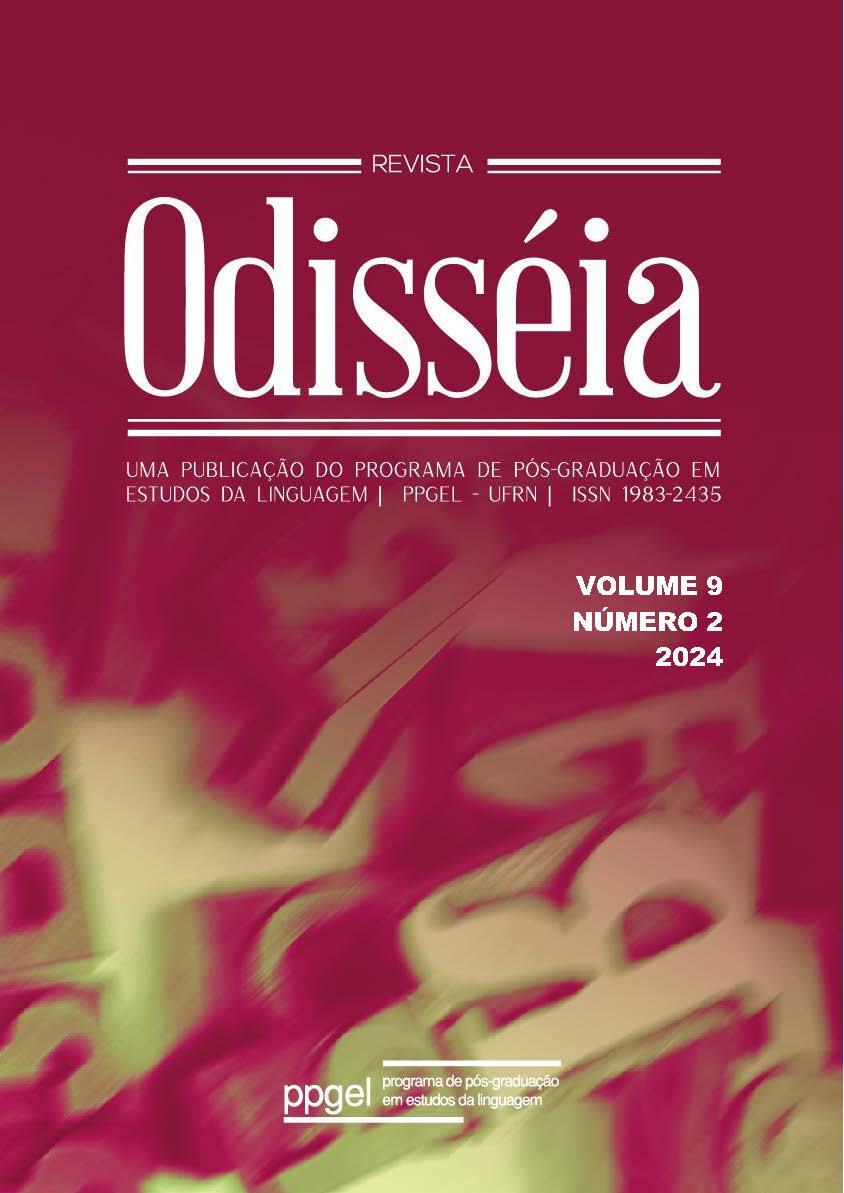“Confesso que chegar em casa e assistir lives não é fácil”: uma análise textual-interativa de concepções de formação continuada (re)produzidas por professores de língua portuguesa em evento de formação online
DOI:
https://doi.org/10.21680/1983-2435.2024v9n2ID34775Palavras-chave:
Formação continuada de professores, Evento de formação online, Referenciação, InteraçãoResumo
Este artigo tem como objetivo analisar as diferentes concepções de formação continuada que são (re)produzidas em uma live destinada a professores de Língua Portuguesa vinculados à rede estadual de ensino do estado do Rio Grande do Sul. Para tanto, articula noções advindas do campo da Linguística Aplicada e da Educação, especialmente em relação à formação continuada de professores, às noções de enquadre interativo, oriunda da Sociolinguística Interacional, e de referenciação, advinda da Linguística Textual, com vistas a uma análise textual-interativa dos sentidos acerca da noção própria de formação continuada coconstruídos pelos participantes do evento de formação online analisado. Trata-se de uma pesquisa qualitativa, de viés interpretativista, com foco na análise da referenciação enquanto fenômeno linguístico-interacional. O corpus de análise é composto de verbalizações (orais e escritas) produzidas pelos formadores e pelos professores em formação em um evento de formação online realizado em agosto de 2022. A análise empreendida revela negociações em torno dos sentidos de formação continuada, ora entendida desde uma perspectiva da racionalidade técnica, ora entendida desde uma perspectiva da racionalidade prática, e reforça as contribuições do estudo da referenciação para a qualificação de práticas linguístico-interacionais desenvolvidas na formação continuada de professores de Língua Portuguesa.
Downloads
Referências
ALARCÃO, I. Professores reflexivos em uma escola reflexiva. 8. ed. São Paulo: Cortez, 2011.
ARAGÃO, A. M. F. Reflexividade: O Princípio da Indissociação entre Teoria-Prática Encarnado na Formação de Professores. Curitiba: Appris, 2022.
COSTA, E. V.; SCHLATTER, M. Eventos de formação de professores: uma perspectiva etnográfica sobre aprender a ensinar. Trab. Ling. Aplic., v. 56, n. 1, p. 37-63, 2017. Disponível em: https://doi.org/10.1590/010318135173200451. Acesso em: 21 nov. 2022.
CRESWELL, J. Projeto de pesquisa: métodos qualitativo, quantitativo e misto. 3. ed. Porto Alegre: Artmed, 2010.
GARCEZ, P. M.; SCHLATTER, M. Professores-autores-formadores: princípios e experiências para a formação de profissionais de educação linguística. In: MATEUS, E.; TONELLI, J. R. A. (Org.) Diálogos (im)pertinentes entre formação de professores e aprendizagem de línguas. São Paulo: Blucher, 2017. p. 13-36.
HOFSTETTER, R.; SCHNEUWLY, B. Knowledge for teaching and Knowledge to teach: two contrasting figures of New Education: Claparède and Vygotsky. Pedagogica Historica. v. 45, n. 4-5, p. 605-629 ago./out., 2009.
IMBERNÓN, F. Formação permanente do professorado: novas tendências. São Paulo: Ed. Cortez, 2009.
JUBRAN, C. C. A. S. Revisitando a noção de tópico discursivo. Cadernos de Estudos Linguísticos, Campinas, v. 48, n. 1, p. 33-4, 2006.
KOCH, I. Como se constroem e reconstroem os objetos do discurso. Investigações, v. 21, n.2. 2008, p. 99-114.
MARCUSCHI, L. A. Análise da conversação. São Paulo: Editora Ática, 1986.
MARCUSCHI, L.A. Atos de Referenciação na Interação Face a Face. Cad. Est. Ling. Campinas, SP, v. 41, p. 37-54, 2001.
MIRA, C. Conversação nas Afasias: Uma Análise do Tópico Discursivo e do Turno Conversacional sob a Perspectiva Textual-Interativa. Ling. (dis)curso, Tubarão, v. 16, n. 1, p. 133-152, jan./abr. 2016.
MIRA, C.; CARNIN, A. Histórias sobre o convívio com a Doença de Alzheimer: contribuições da noção de referenciação para a análise de narrativas no contexto de interações de um Grupo de Apoio. Cadernos de Estudos Linguísticos, v. 59, n. 1, p.157-174, 2017.
MIRA, C.; CUSTÓDIO, K. Contribuições da noção de referenciação para análise da narrativa oral no contexto da atrofia cortical posterior. Revista Investigações, [online], v. 32, p. 01-23, 2019. Disponível em: https://doi.org/10.51359/2175-294x.2019.240157. Acesso em: 14 jun. 2022.
MONDADA, L.; DUBOIS, D. Construção dos objetos de discurso e categorização: Uma abordagem dos processos de referenciação. In: CAVALCANTE, M. M.; RODRIGUES, B. B.; CIULLA, A. (Org.). Referenciação. São Paulo: Contexto, 2003. p.17-52.
PÉREZ GÓMEZ, A. O pensamento prático do professor: a formação do professor como profissional reflexivo. In: NÓVOA, A. (Org.). Os professores e a sua formação. 2 ed. Lisboa: Dom Quixote, 1995.
SALÁRIO dos professores é 35% inferior ao de outras ocupações com ensino superior. In: CEPERS. [S. l.], 26 nov. 2020. Disponível em: https://cpers.com.br/salario-dos-professores-e-35-inferior-ao-de-outras-ocupacoes-com-ensino-superior/. Acesso em: 24 de nov. 2022.
SCHÖN, D. Educando o Profissional Reflexivo: um novo design para o ensino e aprendizagem. Porto Alegre: ARTMED, 2000.
TANNEN. D; WALLAT. C. Enquadres interativos e esquemas de conhecimento em interação: exemplos de um exame/consulta médica. In: RIBEIRO, B.T; GARCEZ, P. M. Sociolinguística Interacional. 2. ed. São Paulo: Loyola, 2002. p.182-196.
ZEICHNER, K. Uma análise crítica sobre a “reflexão” como conceito estruturante na formação docente. Educação e Sociedade: Revista de Ciência da Educação. Campinas: Unicamp, v. 29, n. 103, 2014, p. 535-554, 2008.
Downloads
Publicado
Como Citar
Edição
Seção
Licença
Copyright (c) 2024 Revista Odisseia

Este trabalho está licenciado sob uma licença Creative Commons Attribution-NonCommercial-ShareAlike 4.0 International License.

Este trabalho foi licenciado com uma Licença http://creativecommons.org/licenses/by-nc-sa/4.0

















